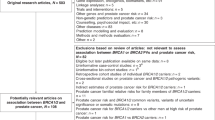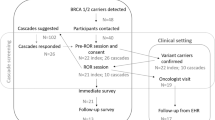Abstract
Variation in the penetrance estimates for BRCA1 and BRCA2 mutations carriers suggests that other genetic polymorphisms may modify the cancer risk in carriers. A previous study has suggested that BRCA1 carriers with longer lengths of the CAG repeat in the androgen receptor (AR) gene are at increased risk of breast cancer (BC). We genotyped 188 BRCA1/2 carriers (122 affected and 66 unaffected with breast cancer), 158 of them of Ashkenazi origin, 166 BC cases without BRCA1/2 mutations and 156 Ashkenazi control individuals aged over 56 for the AR CAG and GGC repeats. In carriers, risk analyses were conducted using a variant of the log-rank test, assuming two sets of risk estimates in carriers: penetrance estimates based on the Breast Cancer Linkage Consortium (BCLC) studies of multiple case families, and lower estimates as suggested by population-based studies. We found no association of the CAG and GGC repeats with BC risk in either BRCA1/2 carriers or in the general population. Assuming BRCA1/2 penetrance estimates appropriate to the Ashkenazi population, the estimated RR per repeat adjusted for ethnic group (Ashkenazi and non-Ashkenazi) was 1.05 (95%CI 0.97–1.17) for BC and 1.00 (95%CI 0.83–1.20) for ovarian cancer (OC) for CAG repeats and 0.96 (95%CI 0.80–1.15) and 0.90 (95%CI 0.60–1.22) respectively for GGC repeats. The corresponding RR estimates for the unselected case–control series were 1.00 (95%CI 0.91–1.10) for the CAG and 1.05 (95%CI 0.90–1.22) for the GGC repeats. The estimated relative risk of BC in carriers associated with ≥28 CAG repeats was 1.08 (95%CI 0.45–2.61). Furthermore, no significant association was found if attention was restricted to the Ashkenazi carriers, or only to BRCA1 or BRCA2 carriers. We conclude that, in contrast to previous observations, if there is any effect of the AR repeat length on BRCA1 penetrance, it is likely to be weak. © 2001 Cancer Research Campaign http://www.bjcancer.com
Similar content being viewed by others
Article PDF
Change history
16 November 2011
This paper was modified 12 months after initial publication to switch to Creative Commons licence terms, as noted at publication
References
Adams JB (1998) Adrenal androgen and human breast cancer: a new appraisal. Breast Can Res Treat 51: 183–188
Buldrook RD, Hayward JL and Spicer CC (1971) Relation between urinary androgen and corticosteroids excretion and subsequent breast cancer. Lancet 1: 395–397
Cauley JA, Lucas FL, Kuller LH, Stone K, Browner W and Cummings SR (1999) Elevated serum estradiol and testosterone concentration are associated with a high risk for breast cancer. Ann Intern Med 130: 270–277
Dunning AM, McBride S, Gregory J, Durocher F and Foster NA (1999) No association between androgen or vitamin D receptor gene polymorphisms and risk of breast cancer. Carcinogenesis 20: 2131–2135
Easton DF, Ford D and Bishop DT Breast Cancer Linkage Consortium (1995) Breast and ovarian cancer incidence in BRCA1 mutation carriers. Am J Hum Genet 56: 265–271
Edwards A and Hammond HA (1992) Genetic variation in five trimeric and tandem repeat loci in four human population groups. Genomics 12: 241
Edwards SM, Bazioch MD, Minter R, Hamoudi R and Collins N (1999) Androgen receptor polymorphisms: association with prostate cancer risk, relapse and overall survival. Int J Cancer 84: 458–465
Ford D, Easton DF, Stratton MR, Narod S and Goldgar D (1998) Genetic heterogeneity and penetrance analysis of BRCA1 and BRCA2 genes in breast cancer families. Am J Hum Genet 62: 676–689
Hakimi JM, Schoenberg MP, Rondinelli RH, Piantadosi S and Barrack ER (1997) Androgen receptor variants with short glutamine or glycine repeats may identify unique subpopulation of men with prostate cancer. Clin Cancer Res 3: 1599–1608
Ingles SA, Ross RK, Yu MC, Irvine RA, La Pera G, Haile RW and Coetzee GA (1997) Association of prostate cancer risk with genetic polymorphisms in vitamin D receptor and androgen receptor. J Natl Cancer Inst 89: 166–170
Isola JJ (1993) Immunohistochemical demonstration of androgen receptor in breast cancer and its relationship to other prognostic factors. J Pathol 170: 31–35
Kazemi-Esfajami P, Trifiro MA and Pinsky L (1995) Evidence for a repressive function of the long polyglutamine tract in the human androgen receptor: possible pathogenic relevance for the (CAG)n expanded neuropaties. Hum Mol Genet 4: 523–527
Kuenen Boumeester V, Van der Kwast TH, Claassen CC, Look MP, Lien GS, Klijn JG and Henzen Longmans SC (1996) The clinical significance of androgen receptor in breast cancer and its relation to histological and cell biological parameters. Eur J Cancer 32A: 1560–1565
La Spada AR, Wilson EM, Lubahn DB, Harding AE and Fischbeck KH (1991) Androgen receptor gene mutations in X-linked spinal and bulbar muscular atrophy. Nature 352: 77–79
Peto J, Collins N, Barfoot R, Seal S, Warren W and Rahman N (1999) Prevalence of BRCA1 and BRCA2 gene mutations in patients with early-onset breast cancer. J Natl Cancer Inst 91: 943–949
Rebbeck TR, Kantoff PW, Krithivas K, Neuhausen S, Blackwood MA and Godwin AK (1999) Modification of BRCA1 -associated breast cancer risk by polymorphic androgen-receptor CAG repeat. Am J Hum Genet 64: 1371–1377
Sereto G and Toniolo P (1989) Androgen and breast cancer in premenopausal women. Cancer Res 49: 471–476
Sereto G, Toniolo P and Berrino F (1991) Serum and urinary androgens and the risk of BC in postmenopausal women. Cancer Res 51: 2572–2576
Sleddens HF, Oostra BA, Brinkmann AO and Trapman J (1992) Trinucleotide repeat polymorphism in the human androgen receptor gene (AR). Nuc Acids Res 20: 1427
Sleddens HF, Oostra BA, Brinkmann AO and Trapman J (1993) Trinucleotide (GGN) repeat polymorphism in the human androgen receptor (AR) gene. Hum Mol Genet 2: 493
Spurdle AB, Dite GS, Chen X, Mayne CJ and Southey MC (1999) Androgen receptor exon 1 CAG repeat length and breast cancer in women before age forty years. J Natl Cancer Inst 91: 961–966
Struewing JP, Hartge P, Wacholdes S, Baker SM and Berlin M (1997) The risk of cancer associated with specific mutations of BRCA1 and BRCA2 among Ashkenazi Jews. New Eng J Med 336: 1401–1408
Thorlacius S, Struewing JP, Hartge P, Olafsdottir GH and Sigvaldasson H (1998) Population-based study of risk of breast cancer in carriers of BRCA 2 mutations. Lancet 352: 1337–1339
Yu H, Bharaj B, Giani M and Diamandis EP (1999) CAG repeat of the androgen receptor gene and its association with survival. Proc Am Ass Cancer Res 40: 2518
Author information
Authors and Affiliations
Rights and permissions
From twelve months after its original publication, this work is licensed under the Creative Commons Attribution-NonCommercial-Share Alike 3.0 Unported License. To view a copy of this license, visit http://creativecommons.org/licenses/by-nc-sa/3.0/
About this article
Cite this article
Kadouri, L., Easton, D., Edwards, S. et al. CAG and GGC repeat polymorphisms in the androgen receptor gene and breast cancer susceptibility in BRCA1/2 carriers and non-carriers. Br J Cancer 85, 36–40 (2001). https://doi.org/10.1054/bjoc.2001.1777
Received:
Revised:
Accepted:
Published:
Issue date:
DOI: https://doi.org/10.1054/bjoc.2001.1777
Keywords
This article is cited by
-
Association of Rad51 polymorphism with DNA repair in BRCA1 mutation carriers and sporadic breast cancer risk
BMC Cancer (2011)
-
CAG repeat length polymorphism in the androgen receptor gene and breast cancer risk: data on Indian women and survey from the world
Breast Cancer Research and Treatment (2011)
-
Androgen receptor status predicts response to chemotherapy, not risk of breast cancer in Indian women
World Journal of Surgical Oncology (2010)
-
Association between androgen receptor gene CAG repeat polymorphism and breast cancer risk: a meta-analysis
Breast Cancer Research and Treatment (2010)
-
BRCA1-associated breast and ovarian cancer risks in Poland: no association with commonly studied polymorphisms
Breast Cancer Research and Treatment (2010)



